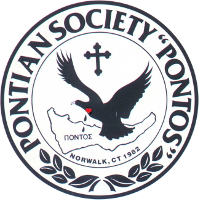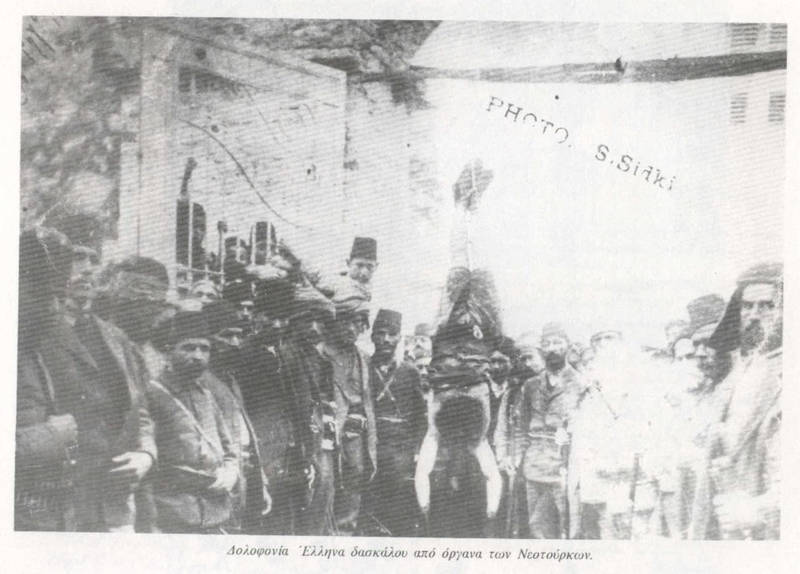We are happy that our representatives of Greek origin of Pontic descent in the Greek Parliament, but also the sympathizers of the Greek Pontians, dared to raise a voice of protest, thus stigmatizing the guilty indifference of the respective Greek Governments for the crime committed in the past. We are happy that the struggles for the recognition of the Genocide of the Greeks of Pontus were finally justified. And it must be understood that problems that remain unsolved on the shelves of Greek history, in the hope that time will give the opportunity to solve them, are not solved later with concessions and compromises on the altar of supposedly good relations and good neighborliness. We will find the problems one day in front of us and the surprise will be much greater.
Only with decisive cuts, such as that of the recognition of the Genocide of Pontian Hellenism, which reveal even belatedly a national solidarity, only in this way will we be justified historically, morally and nationally. It was a demand of Pontian Hellenism, it was an unwritten testament of the 388,000 undefeated Greek Pontians to us younger ones, for the historical justification of a part of Hellenism that did not submit to the banner of Hellenism and Orthodoxy for centuries in the depths of Asia Minor. And it was at least unacceptable to see on the one hand statues erected by Turkey to the murderers of the Greeks of Pontus such as that of the bloodthirsty Turkolaz Topal Osman and on the other by the Greeks, to have a reluctance to acknowledge the cowardly crime committed against Greeks of Pontus. According to the internationally recognized “GENOCIDE” there is when one religious or racial group of people is persecuted by another, simply because it does not belong to the same religious or racial group. In other words, it is the pointless attempt to exterminate or violently uproot an organized group of people who, wanting to maintain their genealogical and religious identity, are not assimilated by the society in which they coexist. This is the international acceptance of the term “GENOCIDE”. However, the UN convention on the prevention and suppression of the crime of GENOCIDE, because it is a crime, Article 2 states:
 In this Convention, GENOCIDE means any of the following acts committed with the intent to destroy in whole or in part the National Ethnological, Tribal or Religious status of the group, ie
In this Convention, GENOCIDE means any of the following acts committed with the intent to destroy in whole or in part the National Ethnological, Tribal or Religious status of the group, ie
1) When there are murders of team members
2) Causing serious damage to the physical or mental integrity of team members
3) The conscious submission of the group to conditions which may result in its complete or partial physical destruction
4) Measures aimed at preventing births in the persecuted group and
5) The forcible removal and transfer of children from one group to another group.
So can we say that what the Turks did to the detriment of Pontian Hellenism was aimed at annihilation, therefore the GENOCIDE of the Greek Pontians? Can we claim that the planned assassinations of the unarmed Greeks of Pontus hid the desire of the neo-Turks to solve the problem of the minorities of the Turkish territory? We claim that yes, it was the purpose and program of Turkey after the GENOCIDE of the Armenians to follow the same method for the Greeks of Pontus and the rest of Central Asia. Only the duration of the disappearance of the Greek element was a few years longer, it began in 1908 with the founding of the Neo-Turkish Committee and ended in 1923 with the closing of the curtain of the Asia Minor drama. Thus, the national and ecclesiastical privileges of Hellenism were circumvented, through which the national status of the Greeks was secured, pushing at the same time for the perversion of the conscience of the Greek youth towards the Turkification of the Pontians and their commercial exclusion. Because it is known that despite the persecutions that preceded against Hellenism, since the fall of Byzantium and the Empire of Trebizond, the always reborn Greek element, was the one who held in his hands the trade in most of the Turkish territory. But let us see what Haris Tsirkinidis writes in the book “THE GENOCIDE OF THE GREEKS OF PONTOS” and especially when it refers to the narration of his uncle Euripides.
So he says:
…..With much suffering we finally reached Kerasounta. The city was full of runaway refugees who fled the terror of the rural Turks and gathered in the cities. There, in Kerasounta, our compatriots warned us that they gather all the Greeks and lock the big ones in the church of Agios Georgios to be exiled every time the number of 250 people fills them, and they lead the little ones in small boats to unknown places. In the church the number 250 was never completed, because there without food, without water, in their own impurities, in a few days most died. With our own eyes, my brother and I saw the children being transported just outside Kerasounta, where they were handed over to the savage Cheetah guerrillas. They grabbed them by the legs and hit their heads on the big rocks of the shore, until they died. It was November 1916. The drama of the unhappy Greeks of Pontus who were displaced cannot be described in words, it would take a Dante to write a second Hell. In all this, if we add the confiscations of the properties of the Greek Pontians, movable and immovable with non-existent reasons, it is now understood that the only thing left in them was self-exile, expatriation. The Turks had an organized plan for the total destruction of Hellenism in Asia Minor and Pontus. They wanted to uproot them in order to end once and for all with the Greeks, as they did shortly before with the Armenian minority. The letter of the commander of the DG Ottoman Army, Vehipasa, which was sent on 31-1-1918 to the Metropolitan of Trebizond, Chrysanthos, states: “It does not escape us much that, especially during the interval between the departure of the Imperial troops and the entry of the enemy (meaning the Russians), the elimination of all deviants and the full assurance of the Ottoman element in the wise and prudent state of Your Highness.” But in order to understand the extent of the catastrophe brought about by the ruthless policy of Turkey at the expense of the enslaved Hellenism of Pontus, we must see this whole edifice created by the Greeks of Pontus, reborn every time the tyrant tried by all means to destroy it.
 So for Pontus before the First World War we have the following statistics.
So for Pontus before the First World War we have the following statistics.
1) 697,000 Greek Christians lived in 11 cities, 41 towns and 1013 villages.
2) In education they maintained 7 semi-gymnasiums, 3 gymnasiums, 1 high school, 1047 schools and primary schools with 75,950 students and another 1,236 teachers.
3) Orthodoxy was served by 1459 clergy and the number of churches was 1,131
4) Finally, in the big cities, the Pontians maintained charities, philanthropic fraternities and many other charitable institutions, which offered their services indiscriminately to Greeks and foreigners.
And it should be known that, Elliniko was created and operated in Pontus, it was done with money and labor offer of the Greek Pontians alone, without the slightest help of Turkey. Thus they managed to save intact the national conscience, the national mindset, the religious and linguistic heritage of their ancestors.
The population of Pontus is also mentioned in the memorandum submitted to the Peace Conference by the Metropolitan of Trebizond on May 2, 1919, the day when the Greek army accidentally landed in Smyrna.
The memo states:
In 1912 the government of Kiamil-pasha, after an official agreement with the Patriarchate, gave seven parliamentary seats to the Greeks of Pontus, three of them in the region of Trabzon, two in the region of Samsun and one in the regions of Kara Hisar and Sinop. Thus, the government officially recognized that there were 700,000 Greeks in Pontus, given that under Turkish electoral laws, one member of the Turkish parliament was elected per 100,000 inhabitants. Given that before 1914 the Greek population of Pontus reached 700,000 let us see in the course of events the spectacular reduction with the known means used by the Turkish governments. And even this number is much higher if we consider that many Greek Pontians covered with the cloak of crypto-Christianity could not officially declare their Greek identity. But also a large number of Greeks of Pontus displaced and expatriated in remote areas of Asia Minor, were not counted in the general population of Pontus. So in 1914 we have 700,000 Greek Pontians.
In 1918, after the organized persecutions of the Greek element, in a semi-official census of the Patriarchate, we find that 440,000 Greeks remained in Pontus. So from 1914 to 1918 260,000 Greek Pontians perished. After the end of the world war and the orgy of murders that followed with the predominance of the neo-Turks, until 1923, we have the extermination of another 128,000 Greek Pontians. If we add these two numbers we have the frightening number of 388,000 Greek Pontians who succumbed to the horrible martyrdoms, premeditated and planned by the Turkish Governments. So we are very lenient when we continue to say that the Greeks of Pontus who were sacrificed before the eyes of indifferent Europe, are only 350,000. And here is our big question. If this violent shrinkage of Pontic Hellenism is not GENOCIDE, then how else can we baptize this unpunished crime of Turkey? If the annihilation of so many thousands of Greeks is not GENOCIDE, then how can we write it in the blank pages of Pontian Hellenism? Can the killers themselves or those who armed the killers’ hands show us the term that suits Turkey’s atrocities? For us Pontic Greeks, for us Modern Greeks who are fortunate to be a continuation of the historical course of our heroic race, it was, is and will remain GENOCIDE and we must move towards its international recognition.
SOYRCE: kotsari.com

